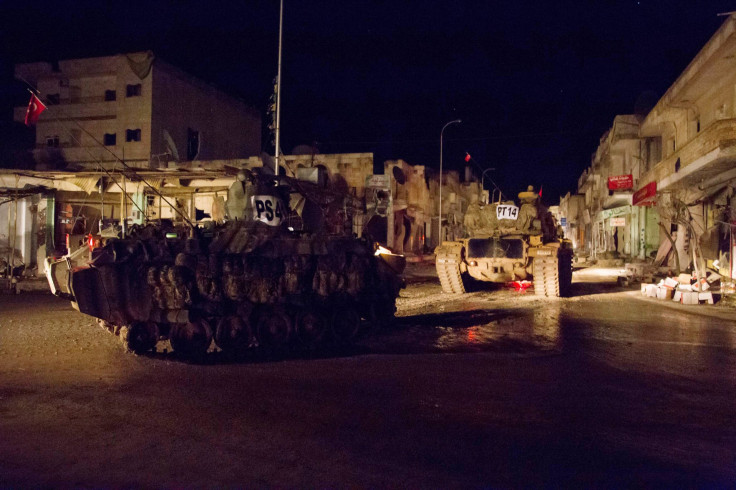Turkey Launches Military Operation Into Syria To Evacuate Troops Guarding Tomb, Says State TV

Update as of 01:15 a.m. EST: Turkish Prime Minister Ahmet Davutoglu said Sunday that a military operation in Syria to evacuate troops guarding a tomb was complete.
He added that the tomb which the troops were guarding was moved into Turkey also, according to the Associated Press. It housed the remains of the grandfather of the founder of the Ottoman Empire, and was regarded by Turkey as its territory.
The military said in a statement that there had been no clashes during the operation but that one soldier had been killed in an accident, Reuters reported.
Original story below
Turkey's armed forces launched a military operation into Syria Saturday, aiming to evacuate around 40 Turkish troops who have been guarding a tomb in the region, according to reports.
A military convoy that included up to 40 tanks and other heavy weaponry was reportedly seen passing through the Syrian town of Kobani Saturday, which Kurdish fighters wrested control of from the Islamic State group, or ISIS, last month.
Turkey's state-run TRT television broadcaster reported early Sunday that the country's military launched the operation overnight, the Associated Press reports.
The operation aims to evacuate stranded Turkish troops who have been guarding the tomb of Suleyman Shah, the grandfather of the founder of the Ottoman Empire. Despite being located in Syria, the tomb is considered to be Turkish territory, as a result of a 1921 accord Turkey signed with France.
The operation was conducted in cooperation with Enver Muslim, the leader of the Syrian Kurdish group in control of Kobani, the New York Times reported.
The action comes just days after Turkey's foreign minister publicly denied that the troops guarding the tomb were trapped by ISIS militants. Mevlut Cavusoglu said allegations that Turkish troops guarding the tomb were unable to leave were “definitely not true,” according to Turkey's Hurriyet Daily News.
Some local media reports have claimed that the troops guarding the tomb, around half of whom are members of Turkey's special forces, have been trapped in the facility by ISIS since March 2014. Turkish journalist Metehan Demir wrote last month that the troops had not been resupplied from Turkey since that time and had been living on food and water provided by ISIS, according to Turkish newspaper Today's Zaman.
Turkey's military incursion, however, is not believed to be a combat operation against the militants. The convoy is believed to be larger and more heavily armed than usual because of recent heavy fighting between the Kurdish militia and Syrian rebel groups against ISIS militants, the BBC reported.
Turkish President Recep Tayyip Erdogan made clear last year that his government considers the tomb sovereign territory that the country values. "It is clear what steps we will take if something happens to the tomb," he said. "This remains for us a sensitive issue."
© Copyright IBTimes 2024. All rights reserved.












